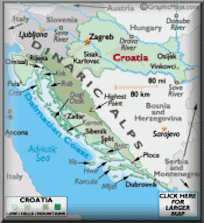-
-

Please Wait...
-
.com.hr Croatian Domain Country Information - .com.hr Croatia (Hrvatska) Country Information
.com.hr

Price and Requirements for .com.hr Domains
Registration Pricing
- 1 Year 48.00 USD
- 2 Years 96.00 USD
Application Fee
Registration Time Frame
2 Days
Requirements
Yes Details Are Individual .com.hr domain registrations allowed?
Yes Details Company or legal entities registrations allowed for .com.hr?
No Details Are there requirements, documents, or information needed for .com.hr?
Yes Details Are some .com.hr domain names restricted?
No Details Does .com.hr domain have a special use?
No Details Other information I need to know about .com.hr?
No Details Are there any additional fees for .com.hr?
No Details Do I need a trademark/brand name to register .com.hr?
No Details WHOIS Privacy service available?
![]() Trustee / Proxy service offered? Fees?
No
Details
Trustee / Proxy service offered? Fees?
No
Details
.com.hr Croatia (Hrvatska) Country Information
Croatia, officially the Republic of Croatia, is a unitary democratic parliamentary republic in Europe at the crossroads of Central Europe, the Balkans, and the Mediterranean. Its capital and largest city is Zagreb. The country is divided into 20 counties and the city of Zagreb. Croatia covers 56,594 square kilometres (21,851 square miles) and has diverse, mostly continental and Mediterranean climates. Croatia's Adriatic Sea coast contains more than a thousand islands. The country's population is 4.29 million, most of whom are Croats, with the most common religious denomination being Roman Catholicism.
In the early 7th century the Croats arrived in area of present-day Croatia. They organised the state into two dukedoms by the 9th century. Tomislav became the first king by 925 AD, elevating Croatia to the status of a kingdom. The Kingdom of Croatia retained its sovereignty for nearly two centuries, reaching its peak during the rule of Kings Peter Krešimir IV and DmitarZvonimir. Croatia entered a personal union with Hungary in 1102. In 1527, faced with Ottoman conquest the Croatian Parliament elected Ferdinand I of the House of Habsburg to the Croatian throne. In 1918, after World War I, Croatia was included in the short-lived State of Slovenes, Croats, and Serbs that declared independence from Austria–Hungary and co-founded the Kingdom of Yugoslavia. A Croatian state briefly existed during World War II as a fascist puppet state. After the war, Croatia became a founding member and a federal constituent of the Second Yugoslavia, a socialist state. In June 1991, Croatia declared independence, which came into effect on 8 October of the same year. The Croatian War of Independence was fought successfully during the four years following the declaration.
Croatia today has a comparatively very high life expectancy, literacy, education, standards of living and income equality, and it ranks high among Central European nations in terms of education, health, quality of life and economic dynamism. The International Monetary Fund classified Croatia as an emerging and developing economy, and the World Bank identified it as a high income economy. Croatia is a member of the United Nations, the Council of Europe, NATO, the World Trade Organization, CEFTA and a founding member of the Union for the Mediterranean. Croatia is an acceding state of the European Union, with full membership expected in July 2013. As an active participant in the UN peacekeeping forces, Croatia has contributed troops to the NATO-led mission in Afghanistan and took a non-permanent seat on the UN Security Council for the 2008–2009 term.
The service sector dominates Croatia's economy, followed by the industrial sector and agriculture. Tourism is a significant source of revenue during the summer, with Croatia ranked the 18th most popular tourist destination in the world. The state controls a part of the economy, with substantial government expenditure. The European Union is Croatia's most important trading partner. Since 2000, the Croatian government has invested in infrastructure, especially transport routes and facilities along the Pan-European corridors. Internal sources produce a significant portion of energy in Croatia; the rest is imported. Croatia provides a universal health care system and free primary and secondary education, while supporting culture through numerous public institutions and through corporate investments in media and publishing. The nation prides itself in its cultural, artistic and scientific contributions to the world, as well as in its cuisine, wines and sporting achievements.
Croatia is located in Central and Southeast Europe, bordering Hungary to the northeast, Serbia to the east, Bosnia and Herzegovina to the south-east, Montenegro to the south-east, the Adriatic Sea to the south-west and Slovenia to the northwest. It lies mostly between latitudes 42° and 47° N and longitudes 13° and 20° E. Part of the territory in the extreme south surrounding Dubrovnik is a practical exclave connected to the rest of the mainland by territorial waters, but separated on land by a short coastline strip belonging to Bosnia and Herzegovina around Neum.
The territory covers 56,594 square kilometres (21,851 square miles), consisting of 56,414 square kilometres (21,782 square miles) of land and 128 square kilometres (49 square miles) of water. It is the 127th largest country in the world. Elevation ranges from the mountains of the Dinaric Alps with the highest point of the Dinara peak at 1,831 metres (6,007 feet) near the border with Bosnia and Herzegovina in the south to the shore of the Adriatic Sea which makes up its entire south-west border. Insular Croatia consists of over a thousand islands and islets varying in size, 48 of which are permanently inhabited. The largest islands are Cres and Krk, each of them having an area of around 405 km2.
.com.hr Croatia (Hrvatska) Domain Name - Country Information
| Country Domain | Croatia (Hrvatska) Domain Name .com.hr |
|---|---|
| Country Information | Croatia (Hrvatska) Domain Country Information .com.hr |
| TLD Bulk & Advanced Search | Croatia (Hrvatska) Bulk Domain Registration .com.hr |
| WhoIs Server | .com.hr Whois Server Information |
| Domain Renewals | Renewal Croatian Domain .com.hr |
| Domain Transfer | Transfer Domain .com.hr |
| Domain Hosting | .com.hr Croatia (Hrvatska) Web Hosting |
| SSL Certificates | SSL Certificates |
| Email Services | .com.hr Croatia (Hrvatska) Email Services |
| Domain FAQ | .com.hr Domain Registration FAQ |
Croatia (Hrvatska) Country Information Search Terms
Croatian Domain Country Information Croatian Domain Registrar Croatian World Wide Domain Registration Croatian Country Code Top Level Domain .com.hr Domain Information Croatian Country Information Croatia (Hrvatska) Country Information











